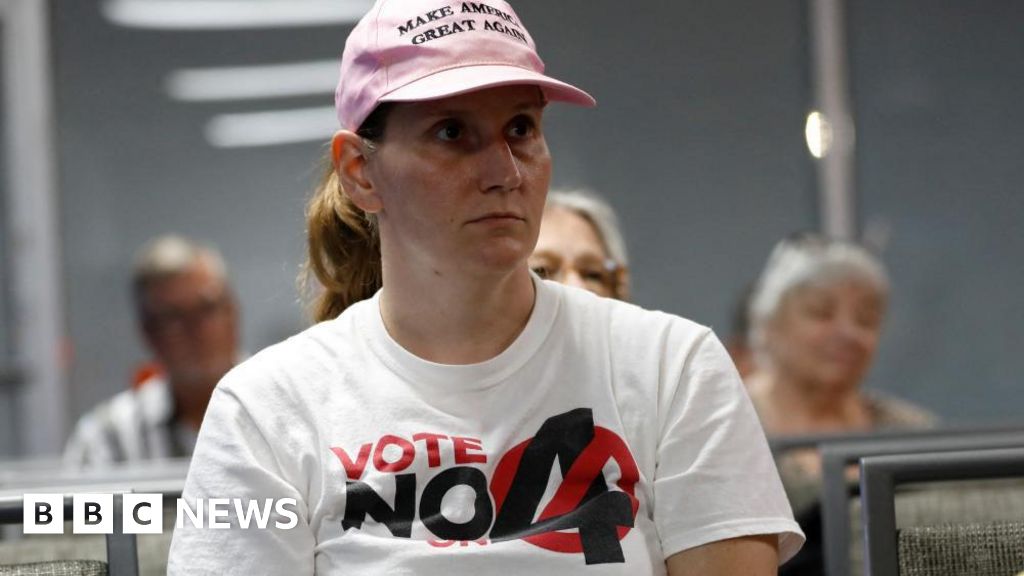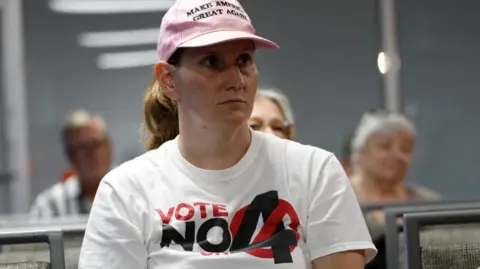Florida amendment fails as six US states expand abortion rights

 Reuters
ReutersVoters in six states have approved measures to protect or expand abortion rights, but a bid to restore protections for the procedure failed in Florida.
The ballot initiative in Florida would have allowed abortion until the point of foetal viability or about 24 weeks, but fell short of the threshold of 60% support in order to pass.
Results are still pending from some of the 10 states where abortion is on the ballot in this election – the first presidential contest since the US Supreme Court struck down the national right to abortion two years ago.
The ruling prompted many states to introduce bans or severe restrictions on the practice, curtailing access for millions of American women.
In previous elections since the decision, campaigns to restore or protect access by using state-level ballot initiatives have met with success, including in reliably conservative states such as Kansas, and had also been credited with helping to mobilise Democratic voters.
But the dynamics were less clear in this election cycle.
In Arizona, more than 60% of voters backed an amendment to protect the right to abortion until the point of viability. The measure extends access from the current 15 weeks currently allowed under state rules.
In Missouri, where a wide majority of voters backed Donald Trump, an amendment aimed at overturning the state’s current ban also appeared on track for victory.
Campaigners in Florida had promoted the amendment as a way to override the strict law enacted earlier this year, which banned abortion after the sixth week of pregnancy, with limited exceptions.
But the measure faced vociferous opposition from Republican Governor Ron DeSantis, who marshalled state resources to persuade voters to vote “no”.
With 95% of the votes reported, the Florida amendment was projected to win support from 57% of voters, according to Reuters.
Florida voter Betsy Linkhorst, a first-time voter, said the result in her state left her “heartbroken, scared and frankly, worried for the future”.
“This was such an important opportunity to protect women’s rights and our ability to make decisions over our own bodies,” the 18-year-old said.
“The setback feels devastating, and I’m saddened to think of the impact this will have on so many women across the state.”
Maria McNally, who voted against the amendment, said she believed that it would have allowed abortions too far into pregnancy.
“I’m happy it failed,” she said.

Mary Ziegler, a law professor at University of California, Davis, said the defeat appeared shaped in part by the state’s turnout for Donald Trump by unexpectedly large margins.
She cautioned against reading too much into the result, given the high bar the measure needed to clear.
“You don’t want to overstate the significance of what happened in Florida,” she said.
Results of abortion related ballot initiatives were still pending in states such as South Dakota and Nebraska, which have laws that bar or curtail access to the procedure.
Most of the initiatives under consideration would allow abortion until foetal viability, which is generally considered about 24 weeks, or later only in instances when the health of the pregnant woman is at risk.
In Maryland and Colorado, where abortion is currently legal, voters approved measures to enshrine a right to the procedure in the state constitutions.
In Colorado’s case, the amendment will also expand access, allowing abortion to be covered under government health insurance plans.
Nevada voters also approved a measure to establish a right to abortion in the state’s constitution. Under current rules, it is allowed until the 24th week, with exceptions to protect the life of the mother.
A majority of voters will have to approve the measure again in two years for the amendment to be enacted.
New York, where abortion is legal until viability, approved an amendment that would bar discrimination due to pregnancy or reproductive health.
When the dust settles from this election, abortion rights activists will have few remaining untried opportunities to use state voter referendums to protect abortion rights, Ms Ziegler said.
“We may see the states continue to be the centre of the struggle or we may not – I don’t think we’ll know that until we know who wins the White House,” she said.

World News || Latest News || U.S. News
Source link




